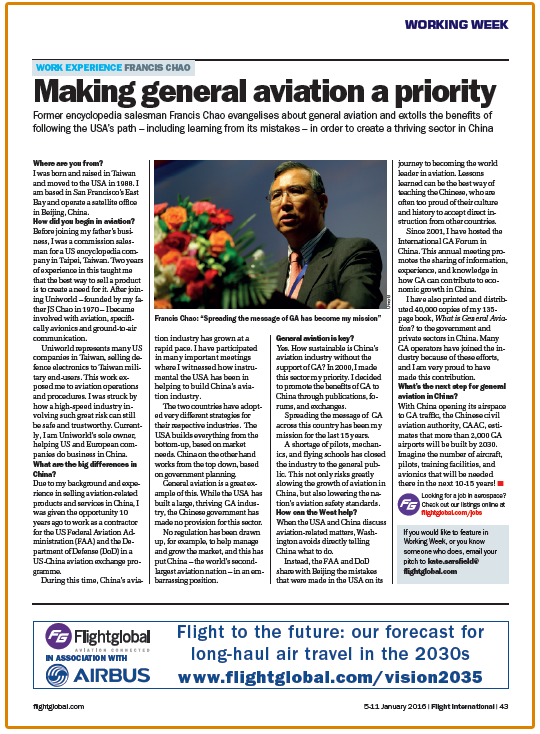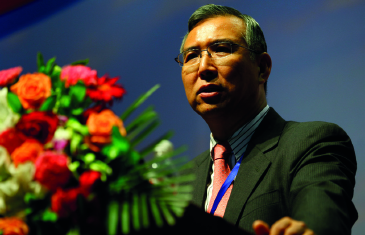
Former encyclopedia salesman Francis Chao evangelises about general aviation and extolls the benefits of following the USA’s path – including learning from its mistakes – in order to create a thriving sector in China

Francis Chao: “Spreading the message of GA has become my mission”
I was born and raised in Taiwan and moved to the USA in 1988. I am based in San Francisco’s East Bay and operate a satellite office in Beijing, China.
Before joining my father’s business, I was a commission salesman for a US encyclopedia company in Taipei, Taiwan. Two years of experience in this taught me that the best way to sell a product is to create a need for it. After joining Uniworld – founded by my father JS Chao in 1970 – I became involved with aviation, specifically avionics and ground-to-air communication.
Uniworld represents many US companies in Taiwan, selling defence electronics to Taiwan military end-users. This work exposed me to aviation operations and procedures. I was struck by how a high-speed industry involving such great risk can still be safe and trustworthy. Currently, I am Uniworld’s sole owner, helping US and European companies do business in China.,
Due to my background and experience in selling aviation-related products and services in China, I was given the opportunity 10 years ago to work as a contractor for theUS Federal Aviation Administration (FAA) and the Department of Defense (DoD) in a US-China aviation exchange programme.
During this time, China’s aviation industry has grown at a rapid pace. I have participated in many important meetings where I witnessed how instrumental the USA has been in helping to build China’s aviation industry.
The two countries have adopted very different strategies for their respective industries. The USA builds everything from the bottom-up, based on market needs. China on the other hand works from the top down, based on government planning.
General aviation is a great example of this. While the USA has built a large, thriving GA industry, the Chinese government has made no provision for this sector.
No regulation has been drawn up, for example, to help manage and grow the market, and this has put China – the world’s secondlargest aviation nation – in an embarrassing position.
Yes. How sustainable is China’s aviation industry without the support of GA? In 2000, I made this sector my priority. I decided to promote the benefits of GA to China through publications, forums, and exchanges.
Spreading the message of GA across this country has been my mission for the last 15 years.
A shortage of pilots, mechanics, and flying schools has closed the industry to the general public. This not only risks greatly slowing the growth of aviation in China, but also lowering the nation’s aviation safety standards.
When the USA and China discuss aviation-related matters, Washington avoids directly telling China what to do.
Instead, the FAA and DoD share with Beijing the mistakes that were made in the USA on its journey to becoming the world leader in aviation. Lessons learned can be the best way of teaching the Chinese, who are often too proud of their culture and history to accept direct instruction from other countries.,
Since 2001, I have hosted the International GA Forum in China. This annual meeting promotes the sharing of information, experience, and knowledge in how GA can contribute to economic growth in China.,
I have also printed and distributed 40,000 copies of my 135- page book, What is General Aviation? to the government and private sectors in China. Many GA operators have joined the industry because of these efforts, and I am very proud to have made this contribution.,
With China opening its airspace to GA traffic, the Chinese civil aviation authority, CAAC, estimates that more than 2,000 GA airports will be built by 2030. Imagine the number of aircraft, pilots, training facilities, and avionics that will be needed there in the next 10-15 years!